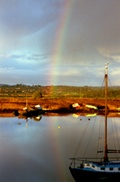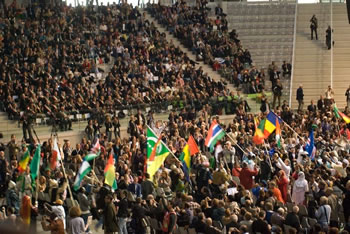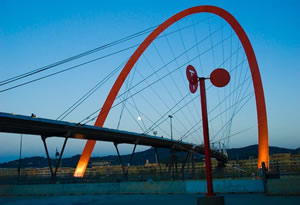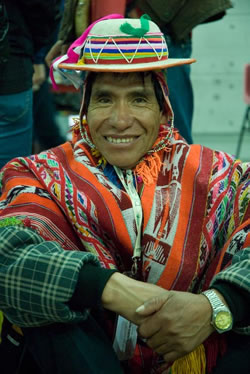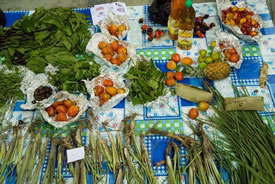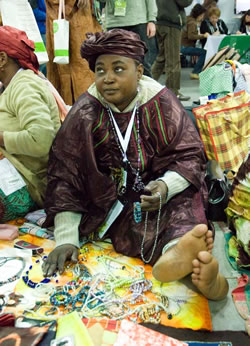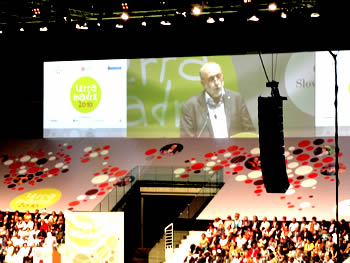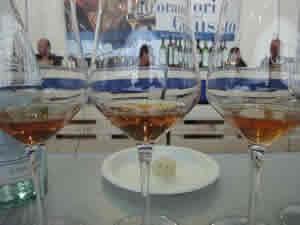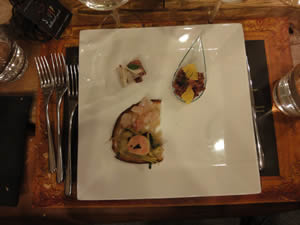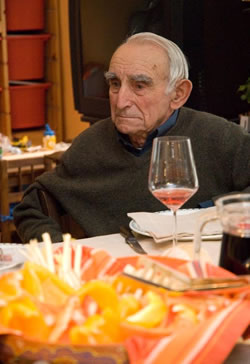
Terra Madre 2010 - "just meeting is a miracle"
report by Marc Millon
photos by Kim Millon
The opening ceremony of Terra Madre 2010Turin, Italy October 21-24, 2010 “Il mondo aperto è bello,” said Sergio Chiamparino, the Mayor of Turin, as he welcomed delegates from around the world to the opening of Terra Madre 2010. “An open world is beautiful. An open world with no walls and no fear, a world that can move forward positively through an exchange of ideas, culture, support.”
TurinTerra Madre must be one of the most open, democratic and diverse gatherings of humanity ever brought together on earth. It is quite fitting that its opening ceremony takes place in an arena created for the Turin Winter Olympics. The Olympics brings the elite athletes of the world together, of course. Terra Madre is unique in bringing together ordinary, humble people – some 6400 participants, including food producers, fishermen, nomadic herdsmen, indigenous farmers, market organisers, cooks and chefs, academics, food writers, musicians, and young people from more than 160 countries around the globe. Every two years this remarkable and varied mass of humanity is gathered together in the city of Turin and the region of Piedmont simply to meet, talk, exchange ideas and help each other. Those from the developing world have their expenses completely paid, enabling people who may never ever have been outside their own village, let alone country, to participate. Terra Madre thus gives a unique platform and opportunity for people from areas of the world that have been marginalised and overlooked to sit at the same table, talk and share, with those from more fortunate regions and countries.
A delegate to Terra Madre 2010If Slow Food has long championed biodiversity in plants and animals then Terra Madre similarly celebrates the diversity of humanity. “A diverse world is a better world,” affirms Carlo Petrini, the dynamic founder of the Slow Food movement.
These are not just pretty words. Slow Food is a movement of ideals and beliefs that are translated into action. This year’s keynote speakers represented the indigenous peoples of the world, those who have had to fight oppression and struggle to maintain their national identities, culture and language.
Adolfo Timótio represented the Guarani Mbya people of South America (parts of Brazil, Paraguay, Argentina and Bolivia). Speaking in his native Guarani, he expressed movingly and with understandable anger the injustice that still exists, even now, some 518 years after the invasion of the American continent by the Spanish and Portuguese, followed by the English, French and Dutch. Indigenous populations have been wiped out, killed, taken into slavery, or died of new diseases. There has been invasion and destruction of lands, and a huge loss of biodiversity – not just plants and animals but human beings too.
“The Earth and everything living is the embodiment of Nhanderu, our Supreme Father. The Earth is sacred. It is our Mother. This land in which we live allows us to exist in the Guarani way. Because of this, we respect Nature. That is why we are here. We need to unite to tell the world that there are other ways to exist alongside Nature, other ways to be human. We can have access to the resources of Nature without destroying her. There are other ways to live that are more just, sustainable and that respect people from different cultures – and where these differences are accepted and respected by all.”
A selection of biodiverse produce brought to Terra MadreAlbina Morilova, representing the continent of Asia, and her own community of Kamchadal on the Kamchatka peninsula, spoke in the Itelmen language. Hers was a similar sad story: of population losses alongside the loss of culture, religion and language, which was suppressed by the Russians. And yet, she explained, Itelmen is a simple language that is most able to express the traditional concepts and culture of the people of Kamchadal, their foods, animals, plants and traditional activities. For example, there are more words in Itelman to express the activity of fishing than there are in Russian.
The women of the society are responsible for maintaining family traditions, undertaking traditional tasks such as making clothing, toys for children, gathering wild foods and herbs to make medicines and traditional dishes. There is a respect for and an understanding of the rhythms of Nature.
But this life is continually under threat. “The large companies fish for everything, simply to make money, not caring whether there will be salmon to return to the rivers of Kamchatka to spawn the next year,” said Albina. “They care nothing for the future.”
Representing the continent of Europe, Ol-Johán Sikku, of the Sámi people of Lapland, whose Sápmi territory now extends across Sweden, Norway, Finland and Russia, proclaimed, “The foundation of our living is based on our traditional knowledge. You cannot survive without Nature.” And yet that way of life is under continual threat. Deforestation, hydroelectric power plants, and the exploitation of minerals are all carried out on Sápmi lands for the benefit of others, not the Sámi people.
He explained a way of life based on the traditional activities, the raising of reindeer, hunting, fishing and the gathering of wild foods. These activities result in a diet that is incredibly healthy and natural. Today scientists speak of the benefits of such a ‘stone age diet’ but the Sámi, together with other indigenous peoples, have long known that such natural foods and traditional foods are fundamental to their survival and existence.
“Indigenous people understand the need to respect and protect Nature, for good, clean food only comes from a clean environment.
“But today that world is changing. Nature is being harmed, wounded. Industrialised countries are contributing to pollution, the poisoning of water, climate change, without coming up with either solutions or with assuming responsibility for the future of our earth. We can’t accept these methods!
“Indigenous people, small farmers, fishermen and all who want to protect the environment, we need to come together in fellowship at Terra Madre to pool our traditional knowledge about how to preserve Nature, to instruct the world to keep it clean and to produce unpolluted foods. We need to take this opportunity collectively to influence the most powerful leaders of the world. Together we can help to create a healthy and sustainable environment. Mother Earth needs our collective wisdom; for if we succeed, she will give us vivid prosperity for eternity and a brighter future for all!”
The impromptu market at Terra Madre 2010It was left to Carlo Petrini to close the opening proceedings. As usual, he did so with great dignity and appreciation of the contributions of the other speakers, noting how much we have to learn from indigenous peoples, above all from their common spirituality based on a deep and profound harmony with Nature. Respect for and the defense of such traditional knowledge is a key for the future. The custodians of traditional knowledge, he said, lie in particular with four important groups: indigenous people, who are innately in harmony with Nature and who maintain traditional systems of belief and spirituality; i contadini – farmers and producers who have always worked the land; women who have traditionally safeguarded ways of cooking, eating and living; and the elderly who know how things were done and always have been done.
“These are the people,” said Carlo, “who not only must be listened to, they must be in the first line of defense against the challenges that this world and this present crisis are presenting us with.” And yet these very groups are the ones who have often been marginalised, usually the least considered by politicians or the media.
Turning to the large numbers of young people attending this, the fourth edition of Terra Madre, he laid down an inspiring challenge: “And I want to say something to you, young people. There are more than 3,000 of you in this assembly. To you, a great opportunity has been given. You are the ones who will have to reconcile science and modern technologies with traditional knowledge. You live in interesting times. Have faith! This is an extraordinary challenge. Do not think that this is anti-modernism. Putting science and modern technology together with traditional knowledge is the most beautiful challenge you will have in the years to come. Take this destiny into your hands! Join together with the old people of your villages and your cities. Be in contact with the wisdom of the women, be in contact with the farmers, the fishermen, who know how to read the seas, the stars, the rivers and the lands. Join together with indigenous people. Never, and never again must there be violence against these people. We have stained ourselves with unbelievable sins in destroying these communities. This will never happen again! You young people have this destiny in your hands. You must not be afraid, you must fly high, you must dream, you must apply yourselves, because this is the most beautiful battle that you can lead at this historic moment. It is the most beautiful battle that young people can fight for humankind.”
Petrini is nothing if not an electrifying orator, especially when preaching to the converted. His message is a powerful, idealistic one, for both young and old. Now is no longer the time simply for material goods, efficiency and profit. There needs to be a return to an interior life based on friendship and brotherhood. Social metamorphosis can be achieved by embracing three essential attitudes: 1) Appreciation of the value of diversity, which is the great creative force in the world; the more diverse the world, the more beautiful; 2) The strengthening of reciprocity, the need to give generously and to receive, setting in motion a generous and virtuous cycle; 3) Understanding the power and value of dialogue, of the meeting, of listening to each other, rediscovering a deeper meaning of fraternity, obtained through meeting and dialogue, united by a common respect for the Earth.
“Live intensely these next four days,” he instructed the youth of Terra Madre, “and let us return home stronger, the better to defend and to expand our Terra Madre network all over the world. Long live our Mother Earth, and long live universal fraternity.”
Thus, the opening ceremony broke up. Over the next four days there were meetings, workshops, conferences and individual conversations and dialogue taking place in the Oval of Lingotto, in all the colourful, cacophonous and beautiful languages of the world. An impromptu market on the floor of the hall was set up each day where delegates offered their traditional handicraft for sale to other delegates: beautiful necklaces and bracelets made from shells, feathers, stone and wood; textiles; hats; food products such as honey, jams, tortillas, flour; as well as expositions of Terra Madre projects around the world. Meanwhile, in another corner of the vast building, Slow Food Taste Workshops were taking place, demonstrating the importance of taste education that underpins the Slow Food movement: workshops devoted to wine, cheese, olive oil, coffee and much more.
What is the value of Terra Madre? It seems, above all, that its ultimate value lies mostly in providing this rare and unique opportunity for the food communities of the world to gather together. There is no strict agenda; people come and go as they wish; and sometimes it seems as if there is little organisation. The logistics for housing the delegates all over Piedmont, feeding them, transporting them each evening to their accommodation are immense. Yet, by bringing the world together, both individual and group discussions evolve that are profound and meaningful, sometimes spontaneously, leading into new areas, new ideas, and the development of new and worthwhile relationships and friendships.
"The value of being together is worth more than all the money in the world," says Carlo Petrini, humbly yet proudly, “Just meeting is a miracle.”
Carlo Petrini at Terra Madre 2010**
What does Terra Madre mean for me? I am not a producer or a fisherman or a farmer or a chef. And yet, as a food and wine writer, as well as a member of Slow Food Devon, deeply involved in our local food community here in South West England, Terra Madre has become an important bi-annual event that I would not want to miss. It is a gathering that above all reaffirms that Slow Food is a movement of ideas and ideals, its system of belief based around the simple and common principle that food should be good, clean and fair.
Last year Slow Food UK nearly tore itself apart. A movement that I have long believed in and supported was at risk of destroying itself through infighting, power struggles, individual egos and political intrigue. It was frankly very disillusioning and many of us considered leaving.
Terra Madre reaffirms why the Slow Food ideal is so important and why as a movement of ideals it continues to have real validity and relevance. This remarkable gathering of humanity reaffirms our place in the world, reminds that though we live in the affluent West, most of the people with whom we share this planet may not be as fortunate as us, yet still manage to lead lives that are incredibly rich and fulfilling, howsoever strange and beautiful. Terra Madre constantly makes you question yourself, your place within the scheme of life and living. Not only are people from around the world brought together at Terra Madre, the event provides a practical framework for dialogue and discussion to take place, through the numerous workshops and meetings that are translated into the eight official languages. Terra Madre thus provides a unique opportunity to mingle with, share food and drink with, and to talk and learn from and about the peoples of the world. Long may it continue!
Notes and references
Slow Food International web site
Youth Food Movement – Our daughter Bella was a youth delegate at Terra Madre and found the event totally inspiring. Some hundreds of young people were housed together in the Olympic Village at Bardonecchia and this provided them the opportunity to meet, talk about projects, share food, drink, and their own cultures. The YFM meeting was increadibly vital, lively, exciting and positive. And, whereas in previous years, I have attended a very special and elite winetasting of ‘tre bicchieri’ award winning wines displayed on the ramps of the old Fiat factory at Lingotto, this year there was a youth food movement ‘eat in’ in the same venue whereby hundreds of young people from around the world sat down together to share traditional foods and food cultures. Bella is already actively involved in sustainable food projects at her school and is now inspired to get more actively involved with both the national and international YFM.
Youth Food Movement International
Slow Food Taste Workshop – Georgian wines in amphora
If Georgia can claim to be the birthplace of wine made from Vitis vinifera, some 8000 years ago, then these rare and exotic wines, fermented in amphorae buried under ground, connect us both directly with an ancient past as well as demonstrate the rich biodiversity that still exists in far-off corners of the world. Georgia has at least 500 indigenous grape varieties found virtually no where else – the winemaking methods are as simple and as primitive as you will find anywhere – and yet they result in wines with exceptionally pure and direct aromas and flavours.
A Slow Food Taste workshop on Georgian wines fermented in amphoraHere’s a video that shows winemaking and the historic heritage of wine in Georgia today.
Slurp! – We enjoyed an amazing meal at this fun, funky Turin city centre restaurant. Run by young people, with edgy and exciting design, the foods and wines were totally natural and, though interpreted in a modern way, rooted in tradition. Paolo Parisi, farmer and chef from Tuscany, created an amazing tasting menu using products and produce from his own farm and the selection of natural wines matched the foods brilliantly. As such, our meal at Slurp! embodied values that were discussed in the Terra Madre declarations, notably the combination of youthful energy with traditional knowledge.
Raviolo di lardo ripieno di pane di montagne e salsa di noci, cotechino con agrumi micro gocce di aceto, olio e finocchietto selvatico, sandwich branzino foie tartufo nero balsamico carciofi crudi misticanza sale grossoCascina Fontana, Barolo – We also took the opportunity while in Turin to take the train to visit Alba’s Saturday market, and then to spend the day with Mario and Luisa Fontana at Cascina Fontana in the Barolo hills at Perno, a tiny hamlet of Monforte d’Alba. The harvest of Dolcetto, Barbera and Nebbiolo grapes had only just been completed and so we were fortunate to enjoy a special feast that traditionally marks this moment of the year: bagna cauda with the new Dolcetto. We enjoyed this meal, prepared by Luisa to traditional recipes handed down the generations, sitting around Mario and Luisa’s dining table in their home in Perno. Zio Armando, Mario’s 92 year old uncle, was at table with us. Born in the Castello di Sinio, where Mario today tends the vineyards, he still helps Mario out, joining in this year’s harvest of Dolcetto, Barbera and Nebbiolo grapes. How many vintages has Armando seen from this single vineyard? Ma chi sa? Tutta la mia vita, he said. Who knows? My whole life.
Zio ArmandoHere are some of my previous reports:
Terra Madre was originally born from the first Slow Food Prize for Biodiversity 2000
![]()
|Home| |QP New Media| |Kim's Gallery|
Copyright © Marc and Kim Millon 1997-2010
![]()
